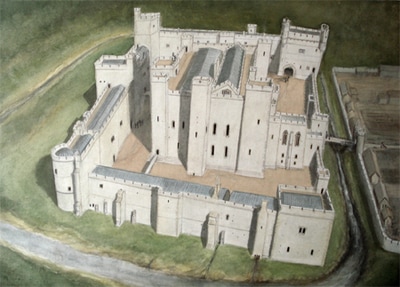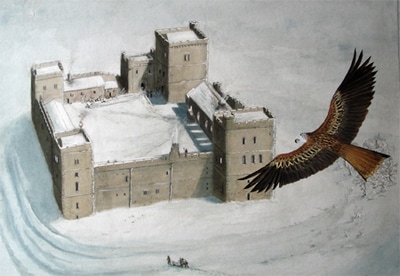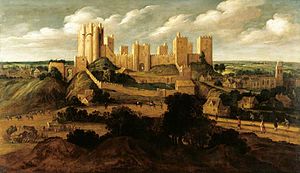There are those who believe that Vaughan, Rivers and Grey were not granted a trial and were murdered on a direct order of Richard, Duke of Gloucester. The Crowland Chronicler writes an account of their arrest as
“Immediately after, this circumstance being not yet known in the neighbouring town, where the king was understood to be, they suddenly rushed into the place where the youthful king was staying, and in like manner made prisoners of certain others of his servants who were in attendance on his person. One of these was Thomas Vaughan, an aged knight and chamberlain of the prince before-named.”
and their execution
“ on their arrival at the town of Pomfret, by command of the said Richard Ratcliffe, and without any form of trial being observed, Antony, earl of Rivers, Richard Grey, his nephew, and Thomas Vaughan, an aged knight, were, in presence of these people, beheaded. This was the second innocent blood which was shed on the occasion of this sudden change.”
and their execution
“ on their arrival at the town of Pomfret, by command of the said Richard Ratcliffe, and without any form of trial being observed, Antony, earl of Rivers, Richard Grey, his nephew, and Thomas Vaughan, an aged knight, were, in presence of these people, beheaded. This was the second innocent blood which was shed on the occasion of this sudden change.”
Known to have presided over the execution was Henry Percy, the Earl of Northumberland. Percy was Warden of the East and Middle Marches, this position had been held by his family for generations, and in Gloucester's absence, he could well have been given the responsibility of the Western Marches. In these positions alone Percy had the authority to oversee a trial, he also held the title of Vice Constable of England.
John Rouses wrote that Rivers, Grey and Vaughan
"were cruelly killed at Pontefract, lamented by almost all and innocent of the deed charged against them, and the Earl of Northumberland, their chief judge”
Rous wasn’t writing years after the event, he was a contemporary writer. I think it's fair to assume that Vaughan, Rivers and Grey were tried.
But what was the evidence that they were convicted on?
John Rouses wrote that Rivers, Grey and Vaughan
"were cruelly killed at Pontefract, lamented by almost all and innocent of the deed charged against them, and the Earl of Northumberland, their chief judge”
Rous wasn’t writing years after the event, he was a contemporary writer. I think it's fair to assume that Vaughan, Rivers and Grey were tried.
But what was the evidence that they were convicted on?
The Woodville family were not skilled or brave, they were ambitious and exceeding lucky, they took on the might of the House of York and won. Their early underhandedness has been mentioned before, it is only their actions in the April of 1483 that are relevant. They attempted to bypass the protectorate, influence the council, they took control of the English fleet and the king’s money and as the Duke of Gloucester attempted to point out to the council once he arrived in London they tried to raise an army with the intent of depriving the Prince of Wales’s protector of his life, weapons with the Woodville insignia brought as evidence to the fact.
In a court of law surely this is a case of intent as well as malice aforethought.
When the game was up the queen hightailed it, calling on God for protection. Rivers and Grey did not have that luxury, they were the first to feel the sting of the blade on their necks as was Thomas Vaughan, his only crime was being caught up in the Woodville slipstream. Many say that these three men's deaths were a foregone conclusion that Gloucester had every intention of taking power and the crown. It's a puzzle though as to why he sent Rivers to Sheriff Hutton and Grey to Middleham castles, both the homes of the Duke of Gloucester and a soft option compared to Pontefract where Thomas Vaughan was sent. Its seems to me that Rivers and Grey's fate was to be considered, Vaughan’s however was not, he was, to a certain extent unimportant, he was cast aside, sending him to Pontefract, the most blood-stained castle in England with its history of death and decay was a death sentence in itself.
In a court of law surely this is a case of intent as well as malice aforethought.
When the game was up the queen hightailed it, calling on God for protection. Rivers and Grey did not have that luxury, they were the first to feel the sting of the blade on their necks as was Thomas Vaughan, his only crime was being caught up in the Woodville slipstream. Many say that these three men's deaths were a foregone conclusion that Gloucester had every intention of taking power and the crown. It's a puzzle though as to why he sent Rivers to Sheriff Hutton and Grey to Middleham castles, both the homes of the Duke of Gloucester and a soft option compared to Pontefract where Thomas Vaughan was sent. Its seems to me that Rivers and Grey's fate was to be considered, Vaughan’s however was not, he was, to a certain extent unimportant, he was cast aside, sending him to Pontefract, the most blood-stained castle in England with its history of death and decay was a death sentence in itself.
Middleham Castle, Sheriff Hutton Castle (Reconstruction by Geoffrey Wheeler) and Pontefract Castle
So did Gloucester intend that these men should die?
Mancini writes that Richard ordered the executions "of his own authority as protector" however he also states that "when by means of the council he could not compass the execution" Of this Paul Murray Kendall notes that Richard may have been confused "by the councils's earlier decision not to put the prisoners to death and was unaware of a later decision" Murray concludes that it was necessary or likely for Richard to proceed against the wishes of the council when he needed their support.
Although all three men were high-status prisoners, Rivers and Grey were the two best bargaining tools Gloucester had. Richard’s initial intentions was to discuss the present situation with the council and if an agreement was reached, that he remained at the head of the council, his protectorship honoured and the equilibrium restored then I believe that Rivers and Grey would have been released and Vaughan along with them.
If Gloucester’s initial intention was to have them tried and executed straight away why not send all three to Pontefract from Stoney Stratford and get it over and done with. It was only when diplomacy did not settle the issue, coupled with the uncovered plots, did Richard order his prisoner's deaths.
Mancini writes that Richard ordered the executions "of his own authority as protector" however he also states that "when by means of the council he could not compass the execution" Of this Paul Murray Kendall notes that Richard may have been confused "by the councils's earlier decision not to put the prisoners to death and was unaware of a later decision" Murray concludes that it was necessary or likely for Richard to proceed against the wishes of the council when he needed their support.
Although all three men were high-status prisoners, Rivers and Grey were the two best bargaining tools Gloucester had. Richard’s initial intentions was to discuss the present situation with the council and if an agreement was reached, that he remained at the head of the council, his protectorship honoured and the equilibrium restored then I believe that Rivers and Grey would have been released and Vaughan along with them.
If Gloucester’s initial intention was to have them tried and executed straight away why not send all three to Pontefract from Stoney Stratford and get it over and done with. It was only when diplomacy did not settle the issue, coupled with the uncovered plots, did Richard order his prisoner's deaths.



